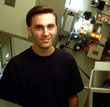 |
|
 Home Home
 Products Products
 Store Store
 Forum Forum
 Warehouse Warehouse
 Contact Us Contact Us

|
|
|
|
 
|
|
Author
|
Topic: 'Print from duplicate negative'
|
Michael Barry
Jedi Master Film Handler

Posts: 584
From: Sydney, NSW, Australia
Registered: Nov 1999
|
 posted 06-20-2002 01:01 PM
posted 06-20-2002 01:01 PM




Recently, we ran a preview screening of an upcoming film at our theatre and the sticker on the box containing the print said that it was 'print #4 from duplicate negative'.I'm not sure how this differs from a regular release print. (Perhaps it doesn't?). A dupe negative must be derived from an IP, so therefore this is a regular release print...what am I missing? Perhaps a duplicate negative differs from an internegative? Can anyone help?
| IP: Logged
|
|
|
|
John Pytlak
Film God

Posts: 9987
From: Rochester, NY 14650-1922
Registered: Jan 2000
|
 posted 06-21-2002 09:01 AM
posted 06-21-2002 09:01 AM





Direct prints from the original negative are rare. Once the "answer print" is approved, the lab usually makes a master positive, from which the duplicate negatives needed for release printing worldwide are made. Although the quality of a direct "EK print" made from the original negative is the best you can get, it puts the original negative at risk for damage (e.g., one of the many cement splices breaking during printing). Release prints made from duplicate negatives can have excellent quality. For "Film Done Right", the proper procedure is to contact print the short pitch original negative (BH-1866 perfs) onto a long pitch master positive (DH-1870 perfs). Then use a (slower) pin-registered step printer to make the short pitch duplicate negatives (BH-1866 perfs). The sound negative is recorded directly onto short pitch sound recording film (KS-1866 perfs). Then contact release prints are made onto long pitch print film (KS-1870 perfs). This method minimizes any slippage in the printers to give the optimum steadiness and sharpness, even with high speed release printing. KODAK VISION Color Intermediate Film is used for making both master positives and duplicate negatives. It is so sharp and fine grained that properly made release prints are almost equal in quality to direct prints. It is also the film of choice for laser recording of "digital intermediates".
http://www.kodak.com/US/en/motion/products/lab/5242.shtml
http://www.kodak.com/US/en/motion/products/lab/tech5242.shtml
http://www.kodak.com/US/en/motion/support/h1/printing.shtml http://www.kodak.com/US/en/motion/support/h1/printingP.shtml#operations ------------------
John P. Pytlak, Senior Technical Specialist
Worldwide Technical Services, Entertainment Imaging
Research Labs, Building 69, Room 7525A
Rochester, New York, 14650-1922 USA
Tel: +1 585 477 5325 Cell: +1 585 781 4036 Fax: +1 585 722 7243
e-mail: john.pytlak@kodak.com
Web site: http://www.kodak.com/go/motion
| IP: Logged
|
|
|
|
All times are Central (GMT -6:00)
|
|
Powered by Infopop Corporation
UBB.classicTM
6.3.1.2
The Film-Tech Forums are designed for various members related to the cinema industry to express their opinions, viewpoints and testimonials on various products, services and events based upon speculation, personal knowledge and factual information through use, therefore all views represented here allow no liability upon the publishers of this web site and the owners of said views assume no liability for any ill will resulting from these postings. The posts made here are for educational as well as entertainment purposes and as such anyone viewing this portion of the website must accept these views as statements of the author of that opinion
and agrees to release the authors from any and all liability.
|
|
|
|

 Home
Home
 Products
Products
 Store
Store
 Forum
Forum
 Warehouse
Warehouse
 Contact Us
Contact Us




 Printer-friendly view of this topic
Printer-friendly view of this topic











